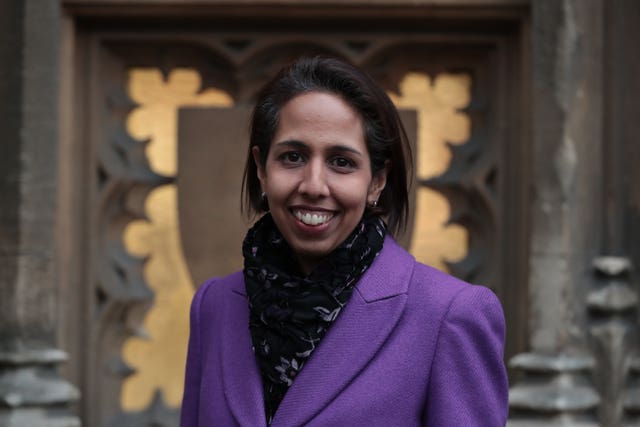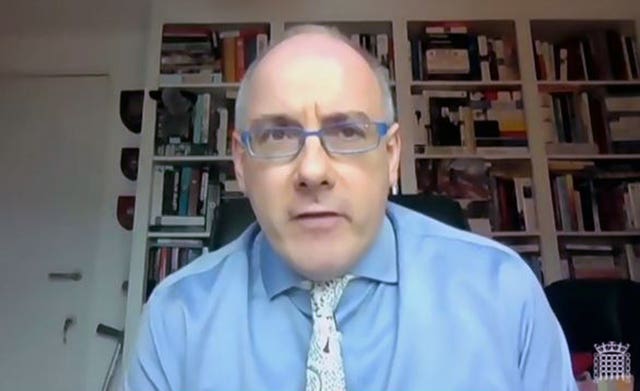Poorest pupils up to eight months behind their peers, MPs warn
The Education Select Committee said there needs to be more transparency over the efficacy of the National Tutoring Programme.

Disadvantaged pupils in poor areas could be up to eight months behind their peers in aspects of their education following the pandemic, MPs have warned.
A new report from the Commons Education Select Committee, published on Thursday, said the Government must also assess the success of the National Tutoring Programme (NTP) under Randstad, and that if the company cannot deliver the scheme effectively, it must be “booted out”.
The report said pupils are facing an “epidemic of educational inequality” and a “worsening mental health crisis” because of school closures and national lockdowns during the Covid-19 crisis.
During the pandemic, studies showed a fifth of pupils did no schoolwork at home or less than an hour a day. The report said that “equally alarmingly”, absence remains high now schools have reopened, with 182,000 pupils missing for Covid-related reasons on February 10.
The Education Committee said the Government needs to take action over persistent absence, ensuring no more pupils became “ghost children” – those who have fallen off the school radar during the pandemic.
It added that the Education Policy Institute (EPI) has said that, in the worst-case scenarios in the poorest communities, disadvantaged pupils could be up to eight months behind their peers in some of their learning, while progress made towards narrowing the attainment gap has been reversed.
It said the Government’s flagship National Tutoring Programme appears to be “failing the most disadvantaged”, with the scheme reaching 100% of its target number of schools in south-west England by March 2021, but only reaching 58.8% of target schools in the North East.
In December 2021, only 52,000 courses had been started by pupils through the tuition partners pillar – 10% of Randstad’s target for this year.
Tuition partners have complained that Randstad – the company contracted to run the tuition partners and academic mentors pillars of the programme – has an online booking platform that is bureaucratic and “dysfunctional” to use.
On Wednesday, schools minister Robin Walker said the take-up of catch-up tutoring has been “slow in parts” but is “on track” to deliver its objectives this year.

Conservative MP Robert Halfon, chairman of the Education Committee, said in the Commons debate on education spending: “The real questions that I have, given the importance of catch up, is whether the catch-up programme is fit for purpose, the National Tutoring Programme particularly.
“And my view is that under the Randstad programme it’s not working.”
During a committee evidence session in January, the NTP’s programme director, Karen Guthrie, was asked about the number of pupils the scheme is supporting who have special educational needs, or are receiving the pupil premium, as well as the number of tutoring providers in the North compared with the South.
Randstad said it would provide MPs with this information, but the committee’s report said it has not received any further statistics or data from the company or from the Department for Education, while Randstad has since removed the requirement of reaching 65% of the poorest pupils through the programme.
The committee said it is “not clear that the National Tutoring Programme will deliver for the pupils that need it most” and that there needs to be full transparency over how the scheme is working, including how many pupils are benefiting and their characteristics, such as if they have a disability.
Statistics should be published every half-term on the number of tutoring sessions started, with information on regional access to the scheme, as well as how many disadvantaged pupils or Send students are being supported.
If Randstad cannot meet its targets for supporting disadvantaged pupils, the DfE should terminate the contract and re-tender it, the committee said.

It should also review plans to reduce funding for the NTP, as this could prove an obstacle to uptake in the poorest areas.
The committee said children are facing a “mental health crisis” which has been exacerbated by the pandemic.
Around one in six children aged between six and 16 have a probable mental health disorder, with witnesses telling the committee that one of the biggest issues for pupils’ mental wellbeing is their access to social media.
It called on the Government to explore the full impact of the pandemic on children, including how their mental health and wellbeing has been affected, “as this is critical to academic attainment”.
It criticised a “spaghetti junction” of catch-up funding, with £5 billion of recovery spending announced by Government since June 2020, and headteachers raising concerns about the “complication” of accessing funds.
The “complex bureaucratic system” for applying for funds may have burdened teachers with more work and hampered schools’ ability to get support for their pupils as quickly as possible, the committee said.
It added that the Government should launch a pilot scheme in the poorest areas to facilitate extra-curricular activities such as sport, music and drama, as well as fast-tracking its commitment for all schools to have a designated mental health lead.
“Moreover, it is not reaching the hundreds of thousands of ‘ghost children’ who have not returned to school,” he said.
“Given the increase in children’s mental health problems, more work needs to be done to rocket-boost support.”
He concluded: “The Government must ensure Randstad shapes up, or boot them out. The catch-up programme must be shown to be reaching disadvantaged pupils and this data must be published.”
A Department for Education spokesperson said: “Tutoring plays an integral role in supporting pupils to catch up on any lost learning and delivery is on track to meet the ambitious target of teaching two million courses this academic year.
“We continue to work with Randstad to ensure as many children from all backgrounds – in particular those from disadvantaged backgrounds – across the country can benefit from high quality tutoring and catch up on lost learning.”
Karen Guthrie, senior programme director of the National Tutoring Programme, said: “The Education Select Committee report is right to focus attention on the National Tutoring Programme and the important role it plays delivering education catch up to pupils whose education has been most impacted by the pandemic. We are working closely with schools across the country who are best placed to select pupils that need tuition the most.
“We have been working in partnership with the Department for Education, schools and tuition partners to look at how we can improve the Programme moving forward to best serve the needs of schools.
“We receive regular feedback from schools and as the Programme evolves want to offer the greatest flexibility to Tuition Partners while removing complexity from the Programme – we want to encourage schools to consider all three tuition routes to best match their needs.”





